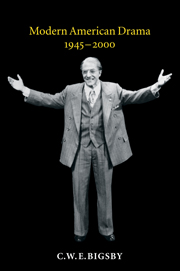Book contents
- Frontmatter
- Contents
- Preface to First Edition
- Preface to Second Edition
- 1 The absent voice: American drama and the critic
- 2 Eugene O'Neill's Endgame
- 3 Tennessee Williams: the theatricalising self
- 4 Arthur Miller: the moral imperative
- 5 Edward Albee: journey to apocalypse
- 6 A Broadway interlude
- 7 Sam Shepard: imagining America
- 8 David Mamet: all true stories
- 9 The performing self
- 10 Redefining the centre: politics, race, gender
- 11 Beyond Broadway
- Notes
- Index
5 - Edward Albee: journey to apocalypse
Published online by Cambridge University Press: 10 December 2009
- Frontmatter
- Contents
- Preface to First Edition
- Preface to Second Edition
- 1 The absent voice: American drama and the critic
- 2 Eugene O'Neill's Endgame
- 3 Tennessee Williams: the theatricalising self
- 4 Arthur Miller: the moral imperative
- 5 Edward Albee: journey to apocalypse
- 6 A Broadway interlude
- 7 Sam Shepard: imagining America
- 8 David Mamet: all true stories
- 9 The performing self
- 10 Redefining the centre: politics, race, gender
- 11 Beyond Broadway
- Notes
- Index
Summary
In 1959 something was coming to an end. The Eisenhower years were drifting to a close. A man whose status as wartime commander linked him to the urgencies of another age was giving way to someone who self consciously presented himself as a harbinger of the new, projecting a new frontier in space and promoting style as a value. The empty materialism of the 1950s, in which consumerism was its own justification, now, under Kennedy, apparently required a moral justification, at least at the level of political rhetoric. And if liberal endeavour was still in the service of cold war politics, as conservative Republicanism had shown itself willing to engage at least some of the political implications of domestic social injustice, the shift in direction was clear. Age was handing the torch to youth. New possibilities were on the agenda.
This was no less true on a cultural level. In the theatre new writers emerged: Jack Gelber, Jack Richardson and Edward Albee. Jack Gelber's The Connection disturbed theatrical as well as social conventions. Here was a play that seemed to allow the temporal sense as well as the social reality of the drug addict onto the stage. Ostensibly improvised, it offered an urban existentialism denied by its own dramatic strategies, as character and plot were drained of content, and language was deformed by context and subordinated to music which alone was genuinely improvised. The Connection had its social roots on the streets and its theatrical roots in Pirandello and Beckett. Nor should the impact of Beckett be forgotten.
- Type
- Chapter
- Information
- Modern American Drama, 1945–2000 , pp. 124 - 153Publisher: Cambridge University PressPrint publication year: 2000



